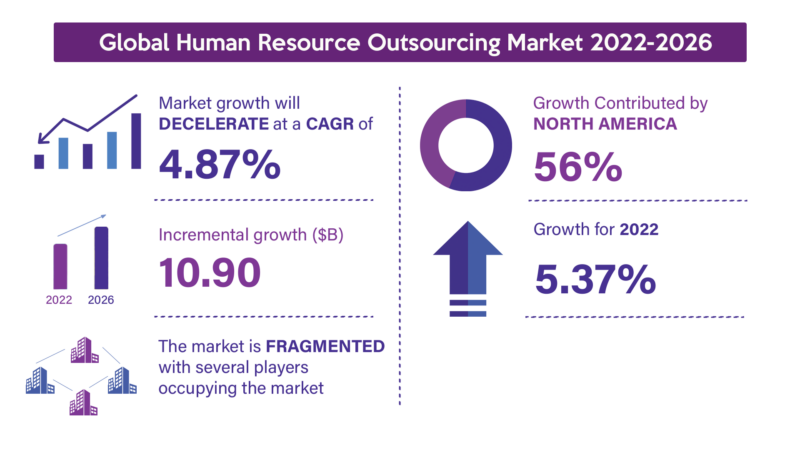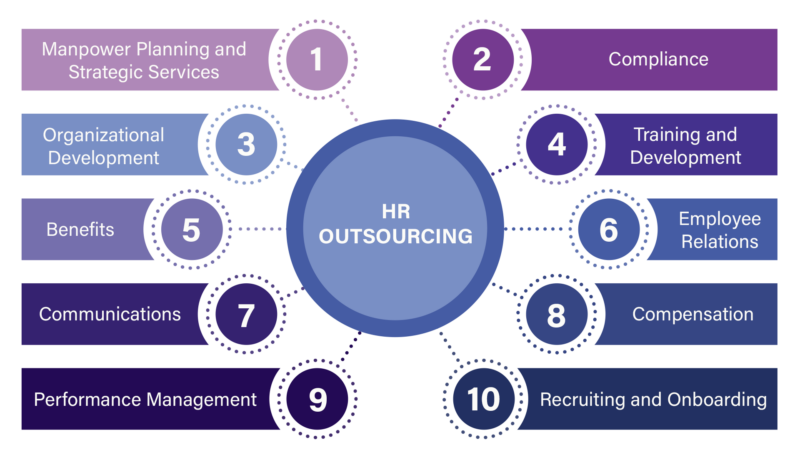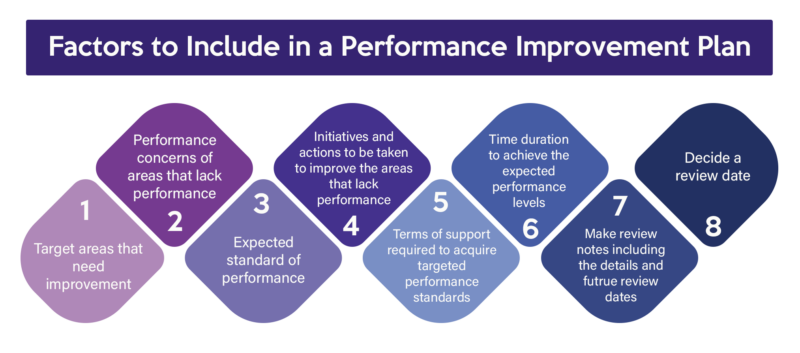
Business process outsourcing (BPO) has become a popular strategic choice for companies looking to optimize their use of resources. Human Resources (HR) is one of the many functions that can be outsourced, and it is crucial in managing an organization’s most valuable asset: its people.
Human Resources Outsourcing is a contract between an employer and a third-party provider in which the employer transfers the management of specific HR tasks to the external service provider. It can be outsourcing one specific facet of one HR function or the entire human resource department.
HR tasks were traditionally done internally by companies. However, as business requirements and complexity have grown, outsourcing HR tasks has become an effective solution to streamline operations, cut costs, and improve efficiency. A professional employer organization (PEO) is one option for small businesses looking to outsource their HR. They provide comprehensive HR services that assist companies in managing day-to-day operations and HR issues.
In this article, we will discuss the benefits of outsourcing HR functions, the steps in outsourcing, the factors to consider, the potential challenges of outsourcing HR, and how to overcome these challenges.
Benefits of Outsourcing Human Resources
Cost Savings
Cost savings on hiring and training
Recruiting, hiring, and training HR personnel can be expensive and time-consuming. Companies that outsource HR can avoid these expenses because HR outsourcing providers handle hiring and onboarding their employees.
Reduction in payroll and benefits expenses
According to Glassdoor, the average salary of an HR manager in the United States is around $80,000 per year. Additional pay, such as a cash bonus, can increase the total pay. Maintaining an in-house HR department requires budgeting for salaries, benefits, and other overhead costs. When you outsource HR services, you spend much less than you would if you hired an internal HR team since the service provider is responsible for compensating their staff.
Elimination of technology and infrastructure expenses
HR functions rely on specialized software, systems, and infrastructure. Companies can avoid the costs of acquiring, implementing, and maintaining these technologies because the HR service provider often covers these as part of their service package.
Improved Customer Satisfaction
Part of the HR department’s job is to treat corporate employees as internal customers. This means that each employee must be treated as a valued client who can expect to be treated respectfully. HR outsourcing companies specialize in efficiently handling HR functions. They have established methods, techniques, and skills to improve the efficiency of several HR functions, such as recruitment, onboarding, payroll administration, and performance review.
Outsourcing firms are often well-versed in managing employee-related concerns. They can provide valuable direction and help in employee training and development, performance management, and conflict resolution. Employees who receive good support and direction are likelier to feel motivated and engaged, resulting in increased customer interactions and satisfaction.
Access to a Larger Pool of Talent
By working with an external HR service provider, companies can access a vast network of experts specializing in various HR functions. These professionals have in-depth knowledge of recruitment strategies and employee management. Outsourced HR companies can help businesses identify and attract top talents that may not be readily available internally.
A further benefit of outsourcing HR is that external providers can quickly change their sourcing techniques to find the best applicant for a particular post. This keeps the hiring process organized and efficient.
Ultimately, having access to a bigger talent pool through outsourcing gives businesses a competitive edge by making it easier to hire top personnel, leading to organizational growth and success.
Improved Efficiency
Outsourcing HR services minimizes the need for the HR internal staff to devote time and resources to administrative responsibilities such as payroll processing, benefits administration, and labor law compliance. This allows them to focus on their primary duties, which increases productivity.
They also contribute expertise in streamlining HR procedures, applying best practices, and leveraging technology to automate routine work. This automation lessens manual errors, reduces paperwork, and speeds up workflows, resulting in more efficient operations and time savings.
Steps for Outsourcing Human Resources Effectively
Companies must carefully navigate the process to effectively outsource human resources while picking the best HR outsourcing services available. You must carefully follow a set of well-defined steps to succeed.
1. Define your human resources needs
When outsourcing HR, it is critical to start defining the HR requirements since it establishes the groundwork for a successful outsourcing partnership. Businesses must express their needs and expectations to potential outsourcing partners by explicitly specifying the HR functions that need to be outsourced. This clarity ensures that the external provider understands the scope of work and can give customized solutions that correspond with the organization’s goals. Without a defined set of requirements, there is a risk of misalignment between the business’ expectations and the service provider’s capabilities.
It is also used to evaluate possible outsourcing partners and select the best fit for the defined HR needs.
2. Research outsourcing options

When considering outsourcing human resources, partnering with a reliable and competent HR outsourcing service is key. Different HR outsourcing companies may specialize in different areas of HR, such as payroll processing, benefits administration, or talent acquisition. Researching outsourcing options assists in identifying partners with competence in the specific HR function your company needs.
It is essential to choose an HR outsourcing company with industry expertise. You can assess their track record and client references by researching outsourcing options. This guarantees that the outsourcing partner understands the unique HR challenges related to your business industry.
Researching your options also helps evaluate the pricing structures and service packages offered by different providers. This allows you to assess the cost-effectiveness of outsourcing human resources operations. A cheaper cost does not always guarantee the best service; thus, a thorough evaluation is necessary.
3. Develop a clear communication plan
A communication plan ensures the business and the outsourcing partner’s objectives, goals, and deliverables are aligned. It defines precise guidelines for communication frequency, channels of communication, and response times. Clear communication channels promote a smooth flow of information between the business and the external partner.
A clear communication strategy establishes a structure for dealing with and resolving issues that may occur during the outsourcing process. It describes the procedure for reporting concerns, escalating issues, and reaching mutually-agreeable resolutions. With a clear communication plan, the business and the HR outsourcing provider can effectively collaborate to identify and manage challenges, ensuring seamless execution of HR tasks.
4. Implement and monitor the outsourcing process
Once the outsourcing agreement is established, it is crucial to have a well-defined implementation plan that specifies how the company will transfer its HR activities to the outsourcing provider. This plan should include a clear timeline, roles and responsibilities, and a communication strategy to ensure a seamless transition.
Regular monitoring is also necessary to assess the outsourcing partner’s performance and adherence to service level agreements (SLAs). This entails monitoring key performance indicators (KPI), performing regular evaluations, and responding quickly to any issues. Monitoring promotes proactive problem-solving, ensuring that outsourced HR tasks meet expectations, and provides opportunities for continual development throughout the outsourcing agreement.

Factors to Consider when Outsourcing Human Resources
While outsourcing HR offers numerous benefits, it is important to consider several factors before outsourcing. Here are some factors to consider:
Quality of services
Payroll processing, benefits administration, and employee record management are all HR operations that require accuracy and compliance with regulatory requirements. Poor-quality HR services can lead to payroll problems, erroneous personal records, and non-compliance with labor regulations. Mistakes in managing employee data and handling personal information can result in legal disputes, fines, or reputational harm to the business.
Quality services are the foundation of trust and long-term partnerships between the company and its outsourcing partners. A reliable outsourcing provider becomes a trusted partner, allowing businesses to rely on their expertise and services.
Availability and accessibility
The availability and accessibility of an outsourcing partner ensure that companies receive prompt support. Having a responsive partner guarantees that concerns can be swiftly addressed when HR issues emerge, minimizing disruptions and maintaining efficient HR processes.
Businesses operating across different time zones should consider their outsourcing partner’s availability for successful communication and assistance. It’s essential to choose a service provider who can accommodate time zone differences, offers 24/7 support if necessary, and ensure that essential HR tasks are accessible regardless of location.
Cost
Considering cost help in comparing various HR service providers and choosing the one that offers the best value for money. The outsourcing provider’s pricing structure and the services included must be evaluated. The common pricing models are fixed monthly fees, hourly rates, and per-employee charges. This should be assessed on how it fits with the HR needs, budget, and potential fluctuations in staffing levels.
While cost consideration is essential, it shouldn’t be the determining factor. It is necessary to balance the importance of cost with other factors, including reliability, service quality, and alignment with organizational goals to ensure a cost-effective and successful partnership.
Cultural compatibility
Every company has its unique set of values, principles, and workplace culture. To be effective, a service provider’s approach to HR processes, policies, and employee relations must be compatible with the organization’s vision and goal.
Employees are more inclined to trust and participate in HR processes when they believe their HR needs are acknowledged and handled with cultural sensitivity. The provider’s ability to recognize and respect the company’s cultural nuances, sensitivities, and diversity results in higher employee satisfaction.
Cultural compatibility becomes more significant when a business operates in different regions. Each location has labor laws, regulations, and cultural norms that affect HR processes. Outsourced HR providers must be well-versed in local laws and cultural norms to ensure compliance and prevent potential legal or reputational issues.
Tips for Successful Human Resources Outsourcing
Foster open and clear communication
Your goals, expectations, and requirements must be clear to your outsourced HR partner. This sets a clear foundation for communication and ensures that your company and the external partner are on the same page. The communication channels should also be established. This may include regular meetings, conference calls, email updates, or project tools.
Someone from your organization should be designated as the primary point of contact between your in-house HR team and the external service provider. This person will be responsible for coordinating communication and managing feedback.
Lastly, encourage a culture where questions, concerns, and suggestions are welcomed. Ask the outsourced provider regularly for feedback regarding their experience, difficulties they are facing, and recommendations for improvement.
Maintain a consistent brand voice
Provide your outsourcing partner with precise brand guidelines outlining your company’s voice, tone, and messaging. Conduct training workshops to educate the outsourced HR staff on your organization’s culture, values, and desired brand voice. To ensure they can effectively represent your brand, you may provide them with examples of phone scripts and email templates.
Use technology to your advantage
Use collaboration and communication tools to ensure constant communication between your internal HR team and the outsourced partner. Platforms like project management software, instant messaging, and video conferencing allow real-time discussions and updates, fostering effective and efficient collaboration.
Utilize technology to automate standard HR processes. Automating processes like benefits enrollment, performance reviews, time tracking, and leave management not only eases administrative duties but also minimizes errors and ensures compliance.
Continuously evaluate and improve the outsourcing process
Conduct regular performance evaluations of the outsourcing partner. Assess their adherence to service level agreements (SLAs), the quality of their work, and their ability to meet agreed-upon deadlines. Collect feedback from various stakeholders involved in the HR outsourcing process. Get their input on communication, responsiveness, accuracy, and overall satisfaction with the outsourced HR services. You may use their input to drive improvements and adjust the outsourcing process accordingly.
Potential Challenges of Outsourcing Human Resources and How to Overcome Them
Cultural and Language Barriers
Cultural and language barriers can present significant challenges if the outsourcing partner operates in a different country. Different cultures have different norms and communication styles, affecting how HR processes are understood and implemented. Language barriers make these challenges more difficult because effective communication and interpretation of information are essential for successful collaboration. Here are some ways to overcome these:
- Choose an outsourcing partner with a multicultural and diverse workforce familiar with your organization’s cultural values.
- Communicate to the outsourcing partner the expectations and cultural nuances.
- Promote cross-cultural understanding through training, cultural awareness sessions, and open communication channels.
- Encourage open communication and provide a safe environment where employees can ask questions or seek further explanations when language barriers arise.
Time Differences
Aligning and organizing schedules can be challenging when teams are spread across multiple time zones. One team may be unavailable when the other team needs instant assistance, which could cause communication delays. This may make handling urgent concerns or resolving HR-related issues more difficult. Here are some ways organizations can mitigate the challenges of time differences:
- Establish clear communication guidelines considering time zone differences. Set clear guidelines for availability, response times, and communication channels.
- Assign dedicated contact points for internal and external groups to facilitate communication and coordination.
- Explore the possibility of staggered work schedules within the external HR team. Assign team members to different time zones to ensure coverage and availability during your company’s business hours.
Maintaining Control Over the Customer Experience
When outsourcing HR services to an external vendor, companies may have trouble aligning the outsourced services with their unique customer experience standards and values. The outsourcing partner may have different techniques, priorities, or communication styles that diverge from the organization’s desired customer experience. To avoid this, you may:
- Clearly specify expectations and deliverables in the outsourcing agreement. Provide guidelines, standards, and metrics to ensure they understand and meet your organization’s requirements.
- Implement performance management processes to monitor the performance of the outsourced partner and ensure compliance with customer experience requirements.
- Regularly conduct audits or assessments to ensure compliance.
- Reinforce your organization’s culture and values and communicate them to your HR service provider. This helps to maintain consistency and ensures that the customer experience is consistent with your organization’s values.
Outsourcing human resources offers several benefits to companies, including cost savings, improved customer satisfaction, access to a larger pool of talent, and improved efficiency. And while companies may benefit greatly from outsourcing their HR operations, several factors must be considered before outsourcing. These factors include the quality of services the service provider offers, their availability and accessibility, their pricing structure, and cultural compatibility. This comprehensive assessment ensures a successful outsourcing engagement that benefits HR processes, employee satisfaction, and overall company performance.
By fostering open and clear communication, using technology, continuously evaluating the outsourcing partner’s performance, and addressing potential challenges such as cultural and time differences, companies can optimize the benefits of HR outsourcing services.



Leave A Comment
You must be logged in to post a comment.